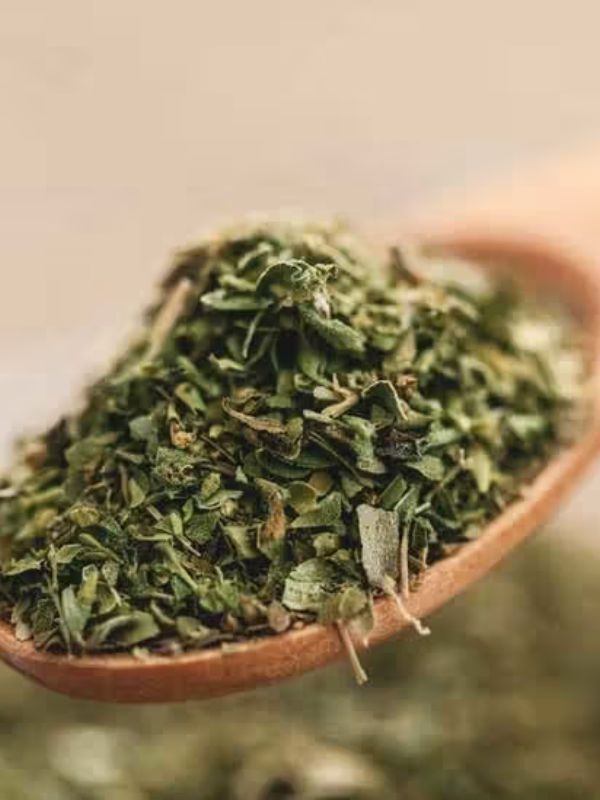Are you looking for a natural way to enhance your health and well-being? Marjoram leaf (Origanum majorana), a fragrant herb often used in cooking, has been cherished for centuries in traditional medicine. It is packed with vitamins, minerals, and powerful antioxidants that support overall wellness.
Whether you want to boost digestion, promote heart health, or reduce inflammation, marjoram leaf offers a wealth of benefits. But how exactly can this humble herb contribute to a healthier lifestyle? Let’s explore the incredible advantages of adding marjoram to your diet.
#1. High in Antioxidants for Cellular Protection
Marjoram is rich in antioxidants like carvacrol, thymol, and rosmarinic acid, which help protect the body from oxidative stress. Oxidative stress is one of the key factors in aging, chronic diseases, and cell damage.
A study published in Food Chemistry found that marjoram’s antioxidant content helps reduce free radicals, which play a role in the development of conditions such as heart disease and cancer.
By consuming marjoram regularly, you can strengthen your body’s defense system against cellular damage.

#2. Supports Digestive Health and Gut Balance
Do you struggle with bloating, indigestion, or stomach discomfort? Marjoram has been traditionally used as a digestive aid due to its ability to stimulate digestive enzymes and bile production.
Its natural antibacterial and antifungal properties help maintain a healthy balance of gut bacteria, preventing issues like bloating, cramps, and constipation.
Drinking marjoram tea before or after meals can soothe digestive discomfort and support better nutrient absorption over time.
#3. Promotes Heart Health by Reducing Inflammation
Heart disease is a leading cause of death worldwide, but dietary choices can significantly impact cardiovascular health. Marjoram contains compounds that help lower bad cholesterol (LDL) while increasing good cholesterol (HDL).
Additionally, its anti-inflammatory properties may reduce the risk of artery-clogging plaque buildup.
A study in Phytotherapy Research suggested that marjoram’s flavonoids may contribute to better heart health by improving blood circulation and reducing hypertension.

#4. Helps Regulate Blood Sugar Levels
If you’re concerned about blood sugar control, marjoram may be a valuable addition to your diet. Research has shown that certain compounds in marjoram help enhance insulin sensitivity and regulate glucose metabolism.
A study in the Journal of Medicinal Food found that marjoram extract could lower blood sugar levels, making it beneficial for those managing diabetes or insulin resistance.
Regular consumption of marjoram tea or adding fresh marjoram to meals may help maintain more stable blood sugar levels over time.
#5. Natural Stress Reliever and Mood Enhancer
Feeling overwhelmed or stressed? Marjoram has natural calming properties that help reduce anxiety and promote relaxation.
It contains linalool and carvacrol, which interact with neurotransmitters in the brain to enhance mood and reduce cortisol levels. Drinking a warm cup of marjoram tea before bedtime can help improve sleep quality and ease stress after a long day.

#6. Supports Hormonal Balance and Menstrual Health
For women dealing with irregular periods, menstrual cramps, or hormonal imbalances, marjoram can be a natural remedy.
A study in the Journal of Human Nutrition and Dietetics found that marjoram tea helped regulate menstrual cycles and improve symptoms of polycystic ovary syndrome (PCOS) by supporting hormonal balance and reducing excess androgens.
Additionally, marjoram may help relieve menstrual cramps and promote overall reproductive health when consumed regularly.

How to Use Marjoram in Your Daily Routine
1. Marjoram Tea for Relaxation and Digestion
Ingredients:
- 1 teaspoon dried marjoram leaves (or 2 teaspoons fresh leaves)
- 1 cup boiling water
- Honey (optional)
Instructions:
- First, place the marjoram leaves in a cup.
- Then, pour boiling water over the leaves and let it steep for 10 minutes.
- Next, strain and sweeten with honey if desired.
- Finally, enjoy this tea before bedtime to promote relaxation or after meals to aid digestion.
2. Marjoram Infused Oil for Massage
Ingredients:
- 1/2 cup olive oil or coconut oil
- 2 tablespoons dried marjoram leaves
Instructions:
- First, heat the oil on low, then add the marjoram leaves.
- Next, let it simmer for about 20 minutes, stirring occasionally.
- After that, strain the oil and store it in a glass bottle.
- Finally, you can apply this oil to sore muscles or joints for relief.
3. Cooking with Marjoram
Marjoram adds a mild, slightly sweet flavor to various dishes. You can:
- Sprinkle fresh marjoram on soups, salads, or roasted vegetables.
- Add dried marjoram to meat, fish, or pasta dishes for extra flavor.
- Blend marjoram with olive oil and garlic for a delicious herb dressing.

Cautions and Precautions
Although marjoram is generally safe, excessive consumption may lead to digestive discomfort. To avoid side effects, stick to recommended amounts.
Pregnant and breastfeeding women should consult a healthcare provider before using marjoram medicinally.
People taking blood-thinning or diabetes medications should talk to their doctor, as marjoram may interact with certain drugs.
Disclaimer
This article is for informational purposes only and is not a substitute for professional medical advice.
Always consult a healthcare provider before adding herbs or supplements to your routine.

Why Marjoram Leaf Deserves a Spot in Your Diet – Backed by Science
